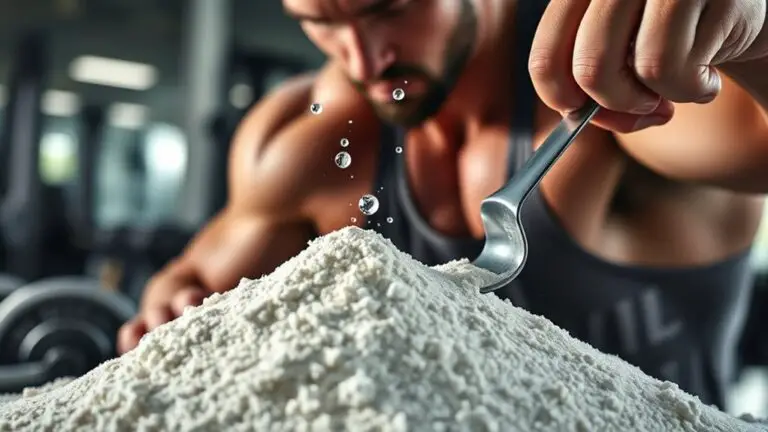Common Diet Mistakes That Affect Gym Performance
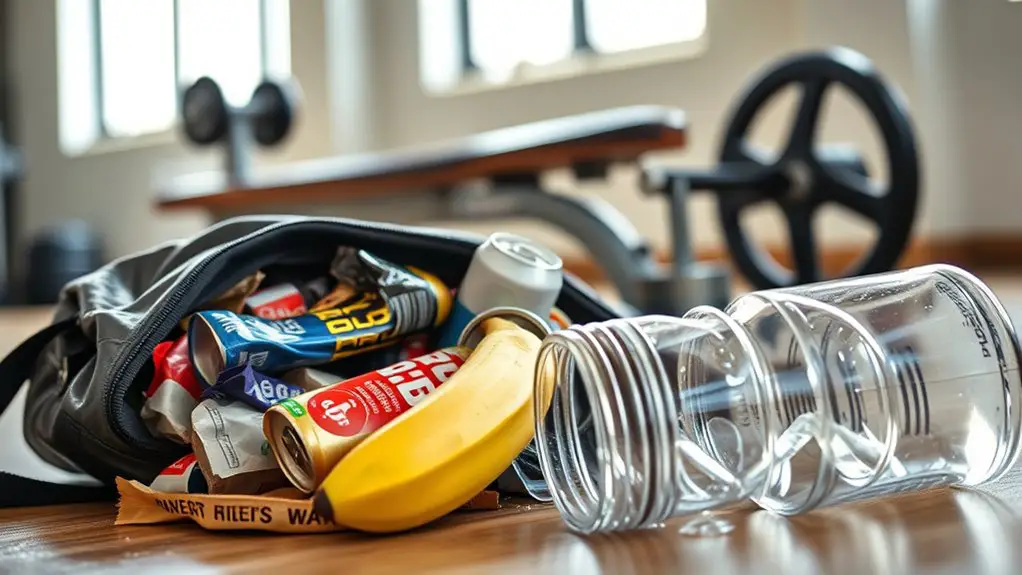
Common diet mistakes that can hurt your gym performance include skipping meals before workouts, which leads to fatigue and dizziness. Overlooking hydration can decrease your energy and focus. Relying on processed snacks and neglecting protein intake may slow muscle recovery. Ignoring micronutrient needs can weaken your immune system. Additionally, failing to plan post-workout nutrition and underestimating carbohydrates can hinder your recovery. Discover how to improve your approach to nutrition for better results in your workouts.
Skipping Meals Before Workouts
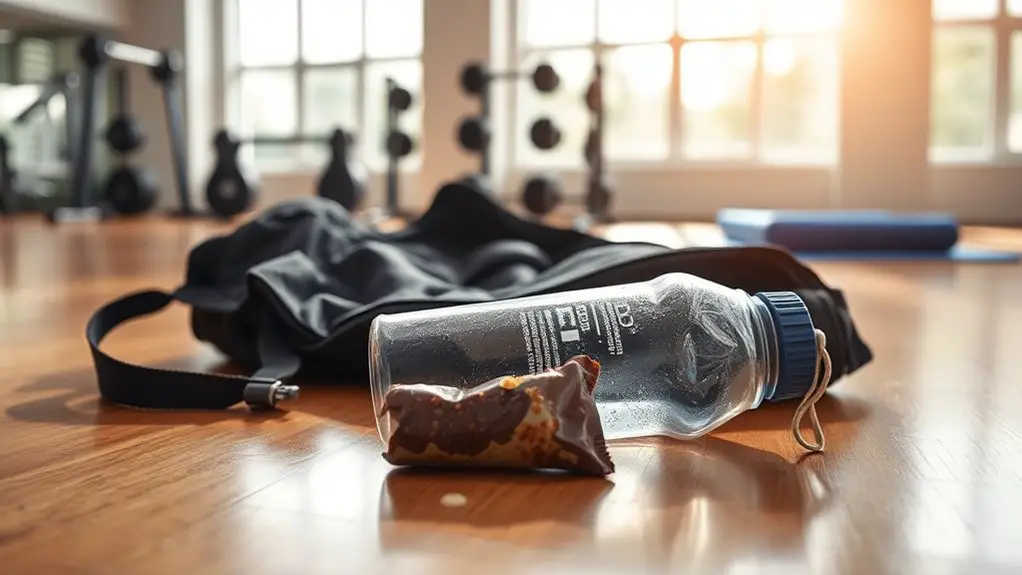
When you skip meals before workouts, you may think you’re saving time or cutting calories, but it can actually hurt your performance. Proper meal timing is essential for fueling your body, especially if you want to maintain high workout intensity. When you exercise on an empty stomach, you risk feeling fatigued, weak, or dizzy, which can lead to improper form and increased injury risk.
Eating a balanced meal or snack an hour or two before your workout gives your body the energy it needs to perform well. Focus on carbs for quick energy and some protein for muscle support. This way, you’ll be able to push through your routine, maximizing your results and staying safe. Remember, your body needs fuel to function effectively, so don’t overlook the importance of pre-workout nutrition. Prioritizing meal timing can make a significant difference in your overall gym experience.
Overlooking Hydration Needs
Many gym-goers underestimate the importance of hydration, but staying properly hydrated can be the difference between a mediocre workout and peak performance. Neglecting your hydration needs can lead to decreased energy levels, impaired focus, and muscle cramping. To maximize your workouts, consider these hydration strategies:
| Hydration Strategy | Benefits | Tips |
|---|---|---|
| Drink Water Before | Maintains energy and focus | Aim for 16-20 oz |
| Electrolyte Drinks | Supports electrolyte balance | Use during long workouts |
| Post-Workout Hydration | Aids recovery and reduces soreness | Rehydrate with water or sports drink |
Make sure to listen to your body’s signals. If you’re feeling thirsty, that’s a sign you need to hydrate. By prioritizing hydration, you’ll support not only your performance but also your overall safety and well-being in the gym.
Relying on Processed Snacks
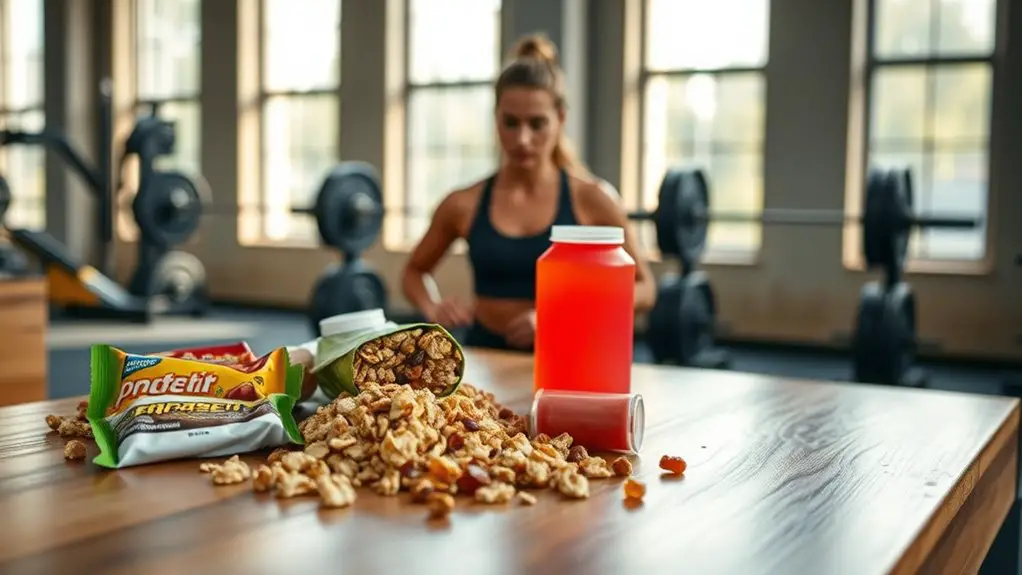
Although it might be tempting to grab a processed snack for convenience, relying on these options can seriously hinder your gym performance. Processed snacks often lack nutrient density, which means they provide empty calories that won’t fuel your workouts effectively. Instead of energizing your body, they can lead to crashes and sluggishness.
You’re better off choosing snack alternatives that are rich in nutrients. Fresh fruits, nuts, yogurt, or whole-grain options offer vitamins, minerals, and healthy fats that support your energy levels and recovery. By prioritizing wholesome snacks, you’ll give your body the fuel it needs to perform at its best.
Neglecting Protein Intake
When you neglect protein intake, you’re missing out on a key element for muscle recovery and growth. It’s essential to focus on timing and choose quality protein sources to maximize your results. Balancing your macronutrient ratios can make all the difference in your gym performance.
Importance of Protein Timing
If you’re serious about maximizing your gym performance, neglecting protein timing can be a vital mistake. After your workouts, your muscles enter a recovery window where protein synthesis is at its peak. If you don’t provide your body with the necessary protein during this essential period, you might hinder your muscle recovery and growth. Consuming protein soon after exercising can help repair muscle fibers and promote recovery, ensuring you’re ready for your next session. Aim for a balanced intake within 30 to 60 minutes post-workout to take full advantage of this window. By prioritizing protein timing, you’ll support your body’s natural recovery processes, enhance performance, and reach your fitness goals safely and effectively.
Choosing Quality Protein Sources
After guaranteeing proper protein timing, the next step is to focus on the quality of the protein sources you choose. High protein quality is essential for peak protein absorption and muscle repair. You should aim for a mix of animal proteins and plant proteins to guarantee a diverse amino acid profile. Here’s a quick guide to help you choose your protein sources wisely:
| Protein Source | Type | Meal Combinations |
|---|---|---|
| Chicken | Animal | Stir-fry, salads |
| Lentils | Plant | Soups, stews |
| Eggs | Animal | Breakfast dishes, wraps |
| Quinoa | Plant | Bowls, side dishes |
| Greek Yogurt | Animal | Smoothies, desserts |
Incorporating protein diversity into your meals can greatly enhance your performance!
Balancing Macronutrient Ratios
Neglecting protein intake while trying to balance your macronutrient ratios can seriously hinder your gym performance. Protein plays a vital role in muscle repair and growth, making it essential for anyone looking to maximize their workouts. Without adequate protein, you risk disrupting your macronutrient balance, which can lead to fatigue and decreased strength.
A well-rounded diet should emphasize energy distribution among carbohydrates, fats, and proteins. If you skimp on protein, you may not provide your body with the necessary tools to recover and build muscle effectively. To guarantee peak performance, aim for a balanced approach that meets your individual needs. Prioritizing protein can enhance your gym experience and help you reach your fitness goals safely and effectively.
Ignoring Micronutrient Requirements
When you ignore your micronutrient requirements, you might be missing out on essential vitamins and minerals that support your overall health. This can lead to decreased energy levels and a weakened immune system, which can seriously impact your gym performance. Paying attention to these nutrients is vital for maximizing your workouts and recovery.
Essential Vitamins and Minerals
While you might focus on macronutrients like proteins, fats, and carbohydrates for your gym performance, overlooking essential vitamins and minerals can sabotage your efforts. These micronutrients play a vital role in your overall health and can impact your workouts. Here are three key points to remember:
- Vitamin Absorption: Without adequate vitamins, your body may struggle to absorb macronutrients effectively, reducing your energy levels.
- Mineral Balance: An imbalance of minerals can lead to muscle cramps and fatigue, hindering your performance.
- Immune Support: Essential vitamins and minerals bolster your immune system, helping you recover and train consistently.
Prioritizing these nutrients guarantees you’re not just fueling your workouts but also supporting your body’s overall function and safety.
Impact on Energy Levels
Ignoring your micronutrient requirements can greatly diminish your energy levels, making it harder to push through workouts. A balanced intake of vitamins and minerals is essential for maintaining energy balance, especially when it comes to meal timing. If you’re not fueling your body correctly, you may struggle to maximize your performance.
| Micronutrient | Role in Energy | Sources |
|---|---|---|
| Iron | Oxygen transport | Spinach, red meat |
| Magnesium | Muscle function | Nuts, whole grains |
| Vitamin C | Iron absorption | Citrus fruits, peppers |
| B Vitamins | Energy metabolism | Eggs, dairy |
| Vitamin D | Muscle strength | Sunlight, fatty fish |
Immune System Support
A well-functioning immune system is essential for anyone who regularly engages in physical activity. Neglecting micronutrient requirements can leave you vulnerable to illness, impacting your performance. To support your immune system, consider incorporating these strategies:
- Consume immune boosting foods: Focus on fruits and vegetables rich in vitamins C and E, like oranges and almonds.
- Stay hydrated: Water is vital for nutrient absorption and maintaining overall health.
- Practice stress reduction techniques: Activities like yoga and meditation can help lower cortisol levels, which may weaken your immune response.
Failing to Plan Post-Workout Nutrition
Many gym-goers underestimate the importance of post-workout nutrition, believing that their efforts end when they leave the gym. However, failing to plan your post-workout meals can severely hinder your post workout recovery. After an intense session, your body needs the right nutrients to repair and rebuild muscle tissue. This is where nutrient timing comes into play. Ideally, you should aim to consume a balanced meal containing protein and carbohydrates within 30 to 60 minutes after exercising. Skipping this vital window may leave you feeling fatigued and slow down your recovery process. Remember, your muscles are like sponges, ready to absorb nutrients right after your workout. By prioritizing your post-workout nutrition, you can enhance your performance and support your overall health. So, don’t overlook this essential aspect of your fitness routine—plan ahead to guarantee your body gets the fuel it needs to recover effectively.
Underestimating the Role of Carbohydrates
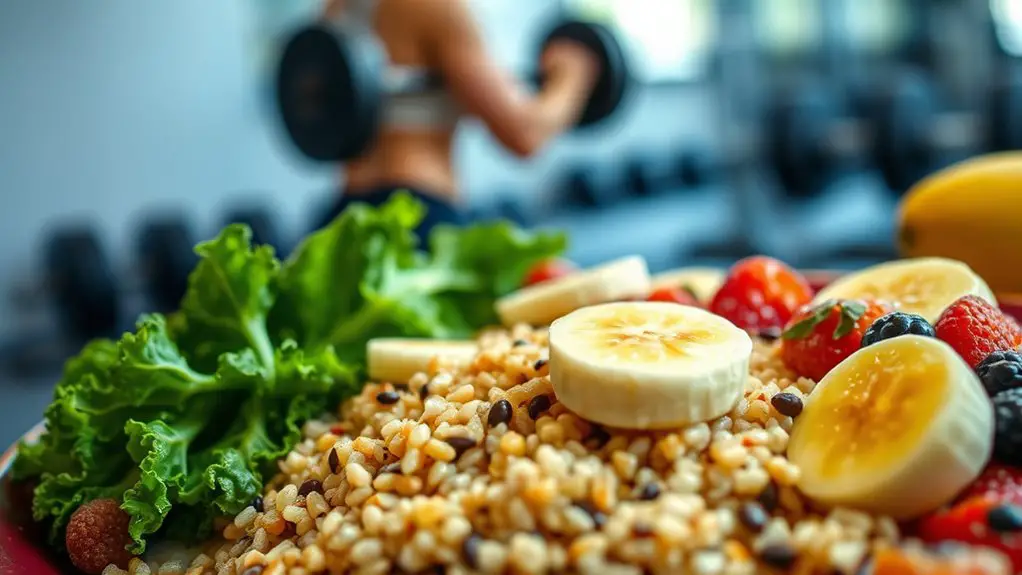
Carbohydrates often get a bad rap in the fitness community, but they’re essential for gym performance. Ignoring their importance can hinder your workouts and recovery. Here’s why you should prioritize carbs:
Carbs are crucial for optimal gym performance and recovery—don’t overlook their benefits!
- Energy Fuel: Carbs are your body’s primary energy source, especially during high-intensity workouts. Without them, you’ll feel fatigued and sluggish.
- Optimal Recovery: Proper carbohydrate timing post-workout can enhance recovery. Consuming carbs after exercising helps replenish glycogen stores and promotes muscle repair.
- Smart Sources: Choose quality carbohydrate sources like whole grains, fruits, and vegetables. These not only provide energy but also essential nutrients for overall health.
Frequently Asked Questions
How Do Specific Diets Impact Muscle Recovery After Workouts?
Specific diets greatly impact your muscle recovery after workouts. Proper recovery nutrition is crucial for muscle repair, helping to reduce soreness and rebuilding damaged fibers. If you’re not consuming adequate protein, carbohydrates, and healthy fats, you might not recover efficiently. Nutrient timing also matters; eating the right foods shortly after exercising can enhance recovery. Focus on a balanced diet to guarantee your body gets what it needs to heal and grow stronger.
Can Caffeine Enhance Gym Performance if Consumed Improperly?
Caffeine can either be your best friend or a troublesome foe, depending on how you use it. If you’re consuming it too close to your workout, the timing might backfire, leading to jitters instead of energy. Similarly, the dosage effects are essential; too much caffeine can cause anxiety and hinder performance. To safely enhance your gym experience, aim for moderate doses, ideally consumed 30-60 minutes before exercising, to maximize benefits without the drawbacks.
What Are the Best Sources of Healthy Fats for Athletes?
For athletes, incorporating healthy fats into your diet is crucial. Avocados, for instance, offer numerous benefits like heart health and improved nutrient absorption. You’ll also want to explore various nut varieties, such as almonds and walnuts, which provide essential omega-3 fatty acids and protein. Just be mindful of portion sizes, as fats are calorie-dense. Balancing these healthy sources can enhance your overall performance and recovery while keeping your diet safe and effective.
How Often Should I Eat to Optimize Gym Performance?
To optimize your gym performance, focus on meal timing and snack frequency. Eating smaller meals every 3-4 hours keeps your energy levels stable and helps with recovery. Don’t skip meals, as this can lead to fatigue or decreased performance. Including healthy snacks between meals can also provide the fuel you need. Listen to your body; if you feel hungry or low on energy, it’s a sign you might need to eat more frequently.
Are There Any Supplements That Can Replace Whole Foods?
Oh sure, let’s just toss out a juicy steak or a colorful salad for a shiny bottle of pills! While supplements can enhance your nutrition, they can’t replace whole foods’ benefits like fiber and antioxidants. Think of supplement effectiveness as the cherry on top, not the entire sundae. A balanced diet is key to safety and ideal health, so embrace those veggies and lean proteins for a well-rounded approach to fitness!



